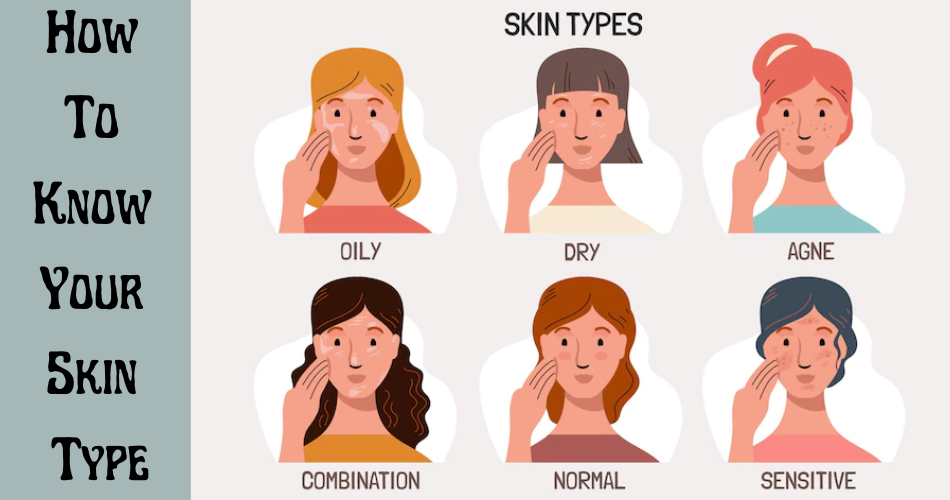Understanding your skin type is more than just a beauty enthusiast’s curiosity – it’s a crucial cornerstone for crafting a skincare regimen that truly works for you. From selecting the right products to addressing specific concerns, unlocking the knowledge of your skin type opens the door to a plethora of benefits that extend far beyond the surface.
Benefits To Know My Skin Type
Identifying your skin type offers several benefits when it comes to skincare and overall skin health:
Effective Product Selection:
Knowing your skin type helps you choose skincare products that are specifically formulated to address your skin’s needs. This can prevent using products that might be too harsh or ineffective for your particular skin type.
Balanced Skincare Routine:
With the right products for your skin type, you can establish a balanced skincare routine that addresses your skin’s unique requirements. This can include appropriate cleansers, moisturizers, serums, and treatments.
Prevent Skin Issues:
Using products suited for your skin type can help prevent common skin issues. For example, if you have oily skin, using products that control excess oil can help prevent acne breakouts. If you have dry skin, using hydrating products can prevent flakiness and irritation.
Improved Skin Texture:
Properly tailored skincare can lead to improved skin texture. For instance, if you have dry skin, using moisturizing products can make your skin feel smoother and more supple.
Enhanced Radiance:
By addressing your skin’s specific needs, you can enhance your skin’s natural radiance. This is particularly true for dry and dull skin types, where proper hydration and exfoliation can lead to a healthier glow.
Reduced Sensitivity:
Understanding your skin type allows you to choose gentle products that are less likely to cause irritation, especially if you have sensitive skin prone to redness and itching.
Targeted Treatment:
If you have specific skin concerns like acne, wrinkles, or dark spots, knowing your skin type enables you to select treatments that are effective for your skin while minimizing potential side effects.
Cost-Effectiveness:
Using products tailored to your skin type can prevent wastage and unnecessary spending on products that may not be suitable for your needs.
Prevention of Premature Aging:
Proper skincare for your skin type can help delay the onset of premature aging signs like wrinkles and fine lines.
Confidence Boost:
When your skin looks and feels healthy, it can boost your self-confidence and overall well-being.
Remember that your skin type can change over time due to various factors, so it’s a good idea to reassess it periodically. If you’re uncertain about your skin type or have specific skin concerns, consulting a dermatologist can provide professional guidance and recommendations tailored to your individual needs.
Types Of Skin
It is important to have a general understanding of the different skin types before attempting to identify your own skin type. This knowledge provides a framework for recognizing the characteristics and qualities associated with each skin type, which can make the process of determining your own skin type more accurate and informed.
When you know the various skin types, you can compare your skin’s characteristics to those descriptions. This comparison helps you narrow down the possibilities and make a more educated assessment. For instance, if you’re familiar with what oily skin looks and feels like, you’ll be better equipped to identify excess oiliness on your own skin.
Skin Types:
There are several different skin types, each characterized by specific qualities and characteristics. Here are the main types of skin:
Normal Skin Type:
Normal skin is well-balanced and not overly oily or dry. It has a smooth texture, small pores, and a healthy complexion. People with normal skin typically experience few breakouts and generally have minimal sensitivity.
Oily Skin Type:
Oily skin produces excess sebum, making the skin appear shiny and often leading to enlarged pores. People with oily skin are more prone to acne breakouts and may need products that help control oil production.
Dry Skin:
Dry skin lacks moisture and can feel tight, rough, or flaky. It may be prone to irritation and redness. Dry skin types require regular hydration and moisturization to maintain comfort and prevent further dryness.
Combination Skin Type:
Combination skin exhibits characteristics of more than one skin type. Commonly, the T-zone (forehead, nose, and chin) is oily or prone to breakouts, while the cheeks and other areas may be normal or dry. It’s important to address the needs of each area when caring for combination skin.
Sensitive Skin Type:
Sensitive skin is easily irritated by various environmental factors and skincare products. It may become red, itchy, or develop rashes in response to certain ingredients. People with sensitive skin need gentle, hypoallergenic products and careful attention to avoid triggering reactions.
Mature/Aging Skin Type:
As skin ages, it naturally loses elasticity and moisture, leading to the formation of wrinkles, fine lines, and age spots. Mature skin often benefits from products that focus on hydration, collagen stimulation, and antioxidants to combat signs of aging.
Acne-Prone Skin Type:
Acne-prone skin is characterized by frequent breakouts, including pimples, blackheads, and whiteheads. This skin type often has excess oil production and clogged pores. Acne-prone skin requires specialized products to control breakouts and maintain a clear complexion.
Rosacea-Prone Skin:
Rosacea is a chronic skin condition that causes redness, visible blood vessels, and sometimes small, red, pus-filled bumps. People with rosacea-prone skin need gentle skincare products to manage redness and avoid triggers that worsen their condition.
Eczema-Prone Skin:
Eczema (or atopic dermatitis) is characterized by dry, itchy, inflamed skin. People with eczema-prone skin require gentle, hydrating products and often need to avoid irritants and allergens that can trigger flare-ups.
Dehydrated Skin Type:
Dehydrated skin lacks water rather than oil. It can occur in any skin type and can make the skin look dull, feel tight, and accentuate fine lines. Proper hydration and moisturization are essential for addressing dehydration.
How To Know My Skin Type
There are five main skin types: normal, oily, dry, combination, and sensitive. Here’s how you can identify your skin type:
Wash your face:
Start with a gentle cleanser to remove any dirt, oil, or makeup from your face. Pat your skin dry with a clean towel.
Observe your skin:
After about an hour, observe how your skin feels and looks. Pay attention to different areas of your face.
Normal skin type:
If your skin feels comfortable, not too oily or too dry, and there are no noticeable patches of oil or dryness, you likely have normal skin. Normal skin is balanced and not prone to extreme oiliness or dryness.
Oily skin type:
If your skin feels slick or greasy, especially in the T-zone (forehead, nose, and chin), you probably have oily skin. Oily skin is prone to shine and may have larger pores.
Dry skin type:
If your skin feels tight, rough, or flaky, and you notice patches of dryness, especially after washing your face, you likely have dry skin. Dry skin can be prone to irritation and may appear dull.
Combination skin type:
If you notice that your T-zone is oily (forehead, nose, chin) while other areas of your face, like your cheeks, feel normal or dry, you may have combination skin. Combination skin exhibits characteristics of multiple skin types.
Sensitive skin type:
If your skin reacts easily to skincare products, becomes red, irritated, or itchy, you likely have sensitive skin. Sensitive skin requires gentle products and careful attention to avoid exacerbating reactions.
Check at different times:
It’s a good idea to observe your skin in the morning, after cleansing, and later in the day to see how it behaves as the day progresses.
What Is My Skin Type Quiz

I can certainly provide you with a basic skin type quiz to help you determine your skin type. Keep in mind that this is just a general guideline and not a substitute for professional advice.
Here are some questions to consider:
How does your skin feel after cleansing?
A. Tight and uncomfortable
B. Comfortable, neither oily nor dry
C. Oily or shiny
How often do you experience breakouts or acne?
A. Rarely or never
B. Occasionally
C. Frequently
How does your skin look by midday?
A. Still feels comfortable, no noticeable shine
B. Slightly oily in the T-zone (forehead, nose, chin)
C. Quite oily, especially in the T-zone
How does your skin react to new skincare products?
A. Rarely reacts, minimal sensitivity
B. Occasional mild reactions, some sensitivity
C. Often reacts, redness or irritation
How does your skin look in its natural state?
A. Even-toned, no visible pores
B. Some visible pores, generally even-toned
C. Enlarged pores, uneven texture
How does your skin react to weather changes?
A. Generally unaffected
B. Can feel drier in cold weather, oilier in hot weather
C. Becomes oilier in hot weather, drier in cold weather
How often do you need to apply moisturizer during the day?
A. Rarely
B. Occasionally, especially in certain areas
C. Frequently, especially to combat dryness
How does your skin react to sun exposure?
A. Tans easily, rarely burns
B. Tans gradually, may experience mild sunburn
C. Burns easily, sensitive to sun exposure
Now, add up the points for your answers:
A answers: 1 point each
B answers: 2 points each
C answers: 3 points each
Scoring:
8 to 12 points: You likely have normal skin.
13 to 18 points: Your skin is leaning towards combination skin.
19 to 24 points: You likely have oily or acne-prone skin.
25 to 30 points: Your skin is on the drier side.
31 to 40 points: Your skin might be sensitive.
Remember, this is just a basic quiz and not a definitive diagnosis. If you have specific concerns or want accurate advice tailored to your skin’s needs, consider consulting a dermatologist.




